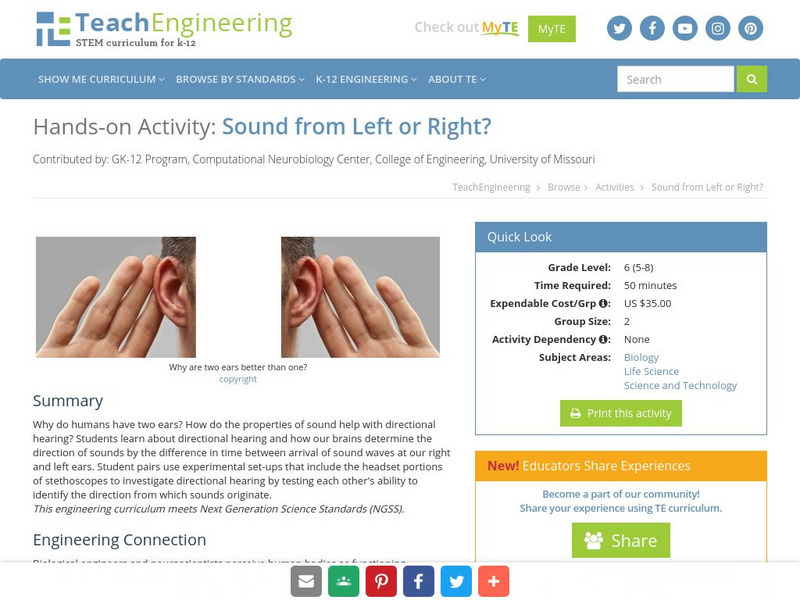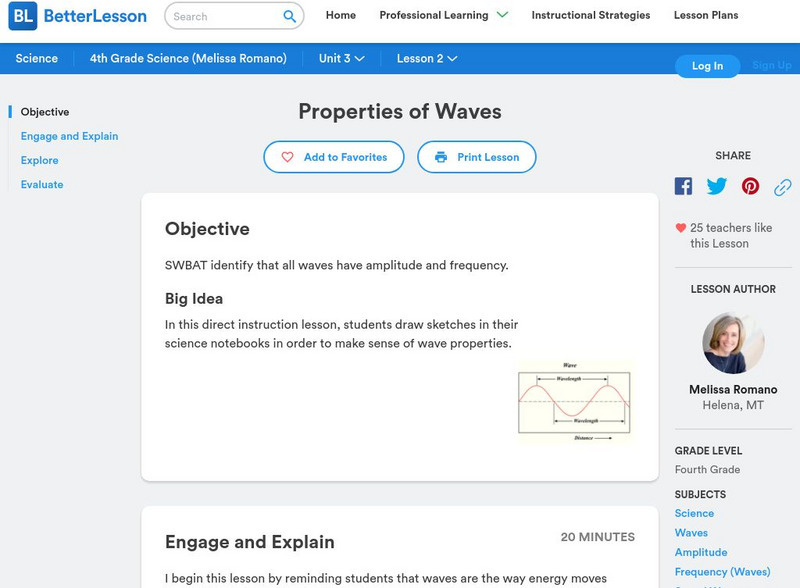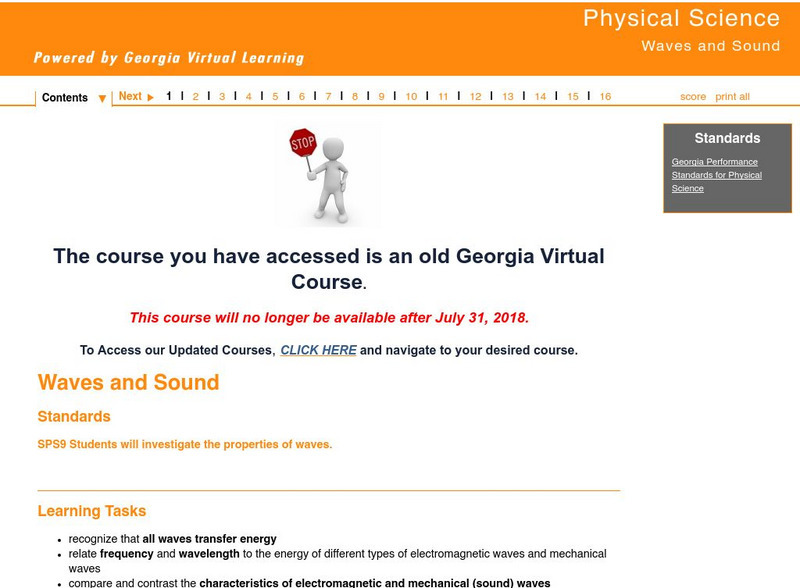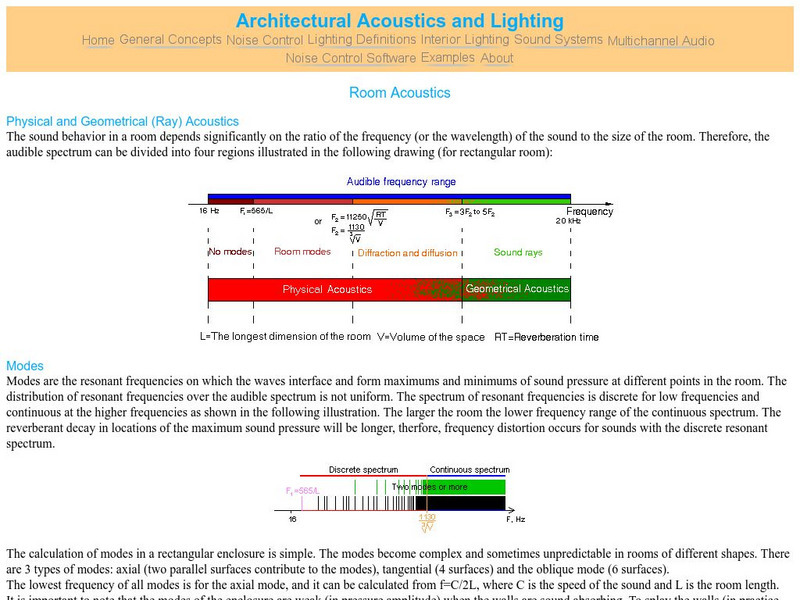PBS
Pbs Learning Media: What Is a Wave?
This interactive activity adapted from the University of Utah's ASPIRE Lab provides an overview of the characteristics and properties of various types of waves, including light waves, sound waves, and water waves.
TeachEngineering
Teach Engineering: Sound
Students learn the connections between the science of sound waves and engineering design for sound environments. Through three lessons, students come to better understand sound waves, including how they change with distance, travel...
TeachEngineering
Teach Engineering: Sound From Left or Right?
Why do humans have two ears? How do the properties of sound help with directional hearing? Students learn about directional hearing and how our brains determine the direction of sounds by the difference in time between arrival of sound...
Better Lesson
Better Lesson: Properties of Waves
In this direct instruction instructional activity, students draw sketches in their science notebooks in order to make sense of wave properties. Resources include a slideshow presentation on the properties of waves and multiple examples...
Scholastic
Scholastic: Study Jams! Science: Energy, Light and Sound: Sound
A video and a short quiz on how sound travels in waves, its properties, and how to measure it.
University of Colorado
University of Colorado: Ph Et Interactive Simulations: Wave Interference
Conduct virtual experiments with water, sound, and light waves to determine the sine wave and patterns created in each.
BBC
Bbc: Gcse Bitesize: Why Do Scientists Think That Light and Sound Are Waves?
Light travels as transverse waves and can travel through a vacuum. Sound travels as longitudinal waves and needs to travel through a solid, liquid or gas. Read about the properties of light and of sound, and learn the differences between...
Physics Central
Physics Central: Physics at Your Desk: Drumming Fingers
An easy experiment through which students explore sound waves while tapping their fingers on a desk or table in a quiet room.
Middle School Science
Middle School Science: Tuning Fork Lab
In this succinct lesson plan, students will compare the sounds produced by tuning forks and observe the behavior of sound waves in different media.
Physics Classroom
The Physics Classroom: Sound Properties and Their Perception
The concept of pitch and frequency is covered in this tutorial. Learn what frequency and pitch are, the difference between infra sound and ultrasonic frequencies, and how pitch is related to the frequency of a sound.
McREL International
Mc Rel: Whelmer #10 Learning Activity: Singing Rod
An easy to do activity that investigates the simple observable properties of sound waves. The activity is presented in lesson plan format that meets NSES standards.
Georgia Department of Education
Ga Virtual Learning: Physical Science: Waves and Sound
In this module, students investigate the properties and behavior of different types of waves.
Intel Corporation
Intel Engage: Designing Effective Projects: Dangerous Decibels
Students investigate sound in their environment, particularly how sounds impact their lives. At the beginning of the unit, students use online simulations to investigate the properties of sound and learn about the components of a sound...
Other
University of Rhode Island: How Sounds Are Characterized
This resource explains how sound is characterized. It provides links to sound properties and their perception as well as properties of waves.
University of New South Wales (Australia)
University of New South Wales: Introduction to Acoustics of Brass Instruments
Discover the acoustical properties of brass instruments from this well researched site provided by the University of New South Wales. Everything from lip control to bell shape is discussed as it applies to frequencies and harmonics.
TeachEngineering
Teach Engineering: Beating the Motion Sensor
Lighting is responsible for nearly one-third of the electricity use in buildings. One of the best ways to conserve energy is to make sure the lights are turned off when no one is in a room. This process can be automated using motion...
Khan Academy
Khan Academy: The Effects of Ear Canal Acoustics on Hearing Ability
This is a five-question quiz related to the passage "The Effects of Ear Canal Acoustics on Hearing Ability."
Canada Science and Technology Museum
Canada Science and Technology Museum: Materials
Test your skill and find out which materials absorb sound well.
Other
Architectural Acoustics and Lighting: Room Acoustics
This site from Architectural Acoustics and Lighting provides a discussion of various factors affecting the acoustics of a given room. Room dimensions, the wavelength of the sound wave, the physical characteristics of the walls, the...
ClassFlow
Class Flow: Thermal Energy
[Free Registration/Login Required] This flipchart reviews properties of thermal energy. Examples of Electrical energy, light waves, sound waves and conduction, convection and radiation are given.
NASA
Nasa: Beginner's Guide to Aerodynamics
Includes exhaustive information and a wealth of activities pertaining to aerodynamics and the physics of flight.
















